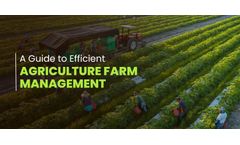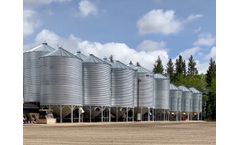Refine by
Agriculture Practices Articles & Analysis
150 articles found
Understanding plant hormones is crucial for improving agricultural practices, enhancing crop sustainability, and bolstering resistance against adverse environmental conditions. ...
Feeding your plants is a fundamental aspect of nurturing a thriving garden, whether you’re aiming for a bountiful harvest or flourishing blooms. However, the choice of fertilizer significantly impacts the health of your plants and the environment. There are two primary types of fertilizers – organic and synthetic. In this article, we’ll delve into the pros and cons of each, ...
Increased Food Security Concerns: The necessity to improve agricultural productivity to meet food requirements is prompting the use of agrochemicals. 3. ...
These machines are designed to process large quantities of organic waste into biochar, offering multiple benefits for agricultural applications. When used as a soil amendment, biochar improves soil fertility, enhances water retention, and reduces greenhouse gas emissions — all of which contribute to more sustainable farming practices. 1. ...
This dual role of promoting growth while also facilitating stress responses underscores the importance of plant hormones in agriculture. By influencing crop yield and resilience, research into plant hormones has become vital for improving agricultural practices and ensuring food security. ...
Its porous structure and chemical properties make it highly effective for soil improvement and environmental benefits. Agricultural practices in developing countries often face hurdles such as: Soil Degradation: Continuous farming and overuse of chemical fertilizers deplete soil nutrients. ...
By utilizing Japonilure as part of an integrated pest management strategy, farmers and growers can reduce their reliance on chemical pesticides and adopt more sustainable pest control practices. This not only benefits the environment but also ensures the long-term health of agricultural ecosystems. ...
Field Irrigation Systems are essential in agriculture since they help provide water to plants where rain may be erratic or unavailable. Given the ever-rising population around the globe, food production is on the rise, and thus, there is a need to maximize agricultural production. Therefore, contemporary field irrigation systems have developed as an all-important tool to facilitate crop growth, ...
This supports a circular economy model where waste is repurposed, adding economic value to agricultural practices. Biochar production also aligns with sustainable agriculture by providing farmers with an alternative to synthetic fertilizers. ...
Agricultural innovation has continually driven the quest for efficient weed management strategies. ...
In an era where agriculture is essential for sustaining the global population, it’s crucial to examine the unseen threats that farming practices pose to aquatic ecosystems. ...
Introduction of Pyroxasulfone Agricultural innovation has continually driven the quest for efficient weed management strategies. ...
The ThirdEye project supports farmers in Mozambique and Kenya with their decision making in farm and crop management by setting up a network of flying sensors operators. Our innovation is a major transformation in farmers’ decision making regarding the application of limited resources such as water, seeds, fertilizer and labor. Instead of relying on common-sense management, farmers are now ...
As global agricultural practices address environmental and economic challenges, regenerative agriculture has stood out as a promising approach to creating more sustainable and robust farming systems. ...
Agriculture has always been a fundamental part of human civilization, providing the food and resources necessary for survival. However, as the global population continues to rise and climate change presents new challenges, the need for efficient agriculture farm management has become increasingly critical. Implementing modern technologies and innovative ...
As global awareness of environmental issues continues to rise, the demand for sustainable waste management solutions is more pressing than ever. In recent years, the push for sustainable practices has brought composting to the forefront of waste management solutions. Composting, the process of decomposing food waste into nutrient-rich soil, has traditionally been a slow, labor-intensive ...
The evolution of bin management systems has been marked by continuous innovation aimed at improving the efficiency, reliability, and profitability of farming operations. Traditional methods, which largely depended on manual labor for monitoring and managing stored grain, have gradually given way to more sophisticated, technology-driven solutions. These advancements, including automation, are ...
Agriculture has been the backbone of human civilization for generations, providing the essential resources needed for survival and growth. As global populations continue to rise, the demand for food production has never been greater. Traditional farming methods, once sufficient, are now struggling to meet the demands of modern food production. New-age techniques in crop management provide ...
This advanced technological approach has proven to be a game-changer, enabling farmers to optimize their agricultural practices and boost ...
This initiative not only propelled their sales but also strengthened their relationships with farmers and dealers, setting a new benchmark in agricultural ...












